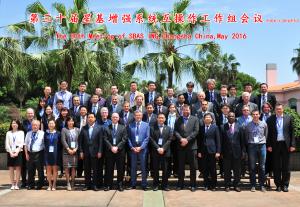AUC Special Technical Committee on Transport, Intercontinental and Interregional Infrastructure, Energy and Tourism (STC-TIIIET) Lomé, May 2017
Posted on: May 23, 2017
On 17th March 2017, the AUC Special Technical Committee on Transport, Intercontinental and Interregional Infrastructure, Energy and Tourism (STC-TIIIET), adopted a Declaration that pave the way towards financing infrastructures in Africa among which telecommunication and information technologies that include GNSS for Africa. More information.
H2020 MAGNIFIC project preparing the 2nd International Conference dedicated to GNSS applications in Lomé for May 2017
Posted on: February 27, 2017

The H2020 MAGNIFIC project coordinated by Pildo and ThalesAlenia Space are preparing the 2nd International Conference dedicated to GNSS applications in Lomé on May 17th and 18th, 2017. As a teaser, the following video recalls ThalesAlenia Space activities in West Africa. To register to the conference: info@magnific-gsa-project.eu“.
Joint Programme Office at SBAS IWG-30 in China (Courtesy JPO)
Posted on: October 10, 2016

JPO participates at the 30th meeting of the Satellite-Based Augmentation System (SBAS) Interoperability Working Group (IWG-30) in Changsha, Hunan, China
This biannual meeting of IWG events took place on May 16th and 17th 2016. The main objective of the IWG meetings is to ensure seamless use of SBAS services through interoperable SBAS systems using common SBAS systems standards. The meeting gathered representatives from nine SBAS projects worldwide.This increased participation demonstrates growing interest in SBAS. Among the African stakeholders representing ongoing SBAS projects in Africa, were the EGNOS in Africa Joint Programme Office (JPO) and ASECNA (Agence pour la Sécurité de la Navigation Aérienne en Afrique et à Madagascar), a leading Air Navigation Service Provider covering 17 States in Africa. The Agenda of this 30th meeting covered various issues regarding harmonization of SBAS modernization plans, SBAS standards, R&D cooperation on key SBAS technologies, and joint SBAS promotion activities.
During the meeting, important information was shared regarding ongoing improvements of global navigation satellite system (GNSS) constellations and progress on the SBAS programs. Regarding the (GNSS) constellations, the launch of GPS Block IIF satellites, which are all in active service, and six satellites to be launched in 2016 for GALILEO were reported. The current status of the Chinese BeiDou programme and the ongoing works on the Japanese Quasi-Zenith Satellite System (QZSS) were also provided.
Regarding the SBAS programs, the European Union (EU) informed the meeting that the EGNOS LPV-200 service was declared on September 29th, 2015 with the first LPV-200 approaches flown on May 3rd, 2016. EU also reported an increased number of LPV procedures implemented in Europe currently totaling 261 and supporting 153 airports. Further, the EU announced potential early service capability for Category-1 (10-meter Vertical Alert Limit) service with partial GPS and Galileo constellations based on its planned EGNOS V3 with Dual Frequency Multiple Constellation (DFMC) SBAS capability. In the meantime, EGNOS V2 evolutions will continue with v2.4.2, which will have two releases in 2019 and 2020. The status and modernization plans of the SBAS and GNSS programmes were also provided with regard to MSAS-JAPAN, GAGAN-India, BDSBAS-China and KASS-Korea.
Regarding the SBAS programs in Africa, it was indicated that the ASECNA Programme includes ownership and provision for a system able to support RNP APCH operations with limited L1 capability in 2019/2020 and L1/L5 capability in 2023. In addition, ASECNA reported that the ‘SAGAIE’ project experiments with the French government space agency, Centre National d’Etudes Spatiales (CNES), which deployed Global Navigation Satellite System (GNSS) stations in the ASECNA area, showed good availability results using the EGNOS v.2.4.1M aided by additional ionosphere monitoring algorithm. The role of the EGNOS in Africa Joint Programme Office (JPO) as a support instrument to the harmonization of SBAS – EGNOS activities in Africa was also narrated. It was reported that, implementation of SBAS – EGNOS in Africa has a main goal of having African SBAS capabilities by 2025 through a modular approach. In this respect, availability of DFMC SBAS is anticipated to support this goal.
The event provided all participants with a unique opportunity to the updates on SBAS and GNSS programmes worldwide. More specifically, for JPO, information gathered will contribute to its support to all initiatives on the African side and ongoing implementation of the Programme ‘Support to EGNOS in Africa’. We believe that increased awareness of the IWG members on the SBAS initiatives in Africa and the ‘EGNOS in Africa Support’ Programme’ will contribute to the integration of Africa in the global SBAS and GNSS programmes’ coordination.
Cooperation between ECCAS-Secretariat General and its Members and EGNOS-AFRICA Joint Programme Office (Courtesy JPO)
Posted on: October 10, 2016

The 26th of July 2016 marked the beginning of cooperation between ECCAS and the Joint Programme Office (EGNOS in AFRICA Support Programme -Joint Programme Office), ” JPO ” , by signing the Memorandum of Cooperation; ECCAS represented by its Secretary General His Excellency Ambassador Ahmad Allam -Mi , and JPO represented by its Director , Mr Ladislaus Matindi.
The signed Memorandum of Cooperation will guide the collaboration between the two organizations in the field of satellite navigation, specifically on the potential implementation and operation of GNSS / EGNOS in ECCAS member States and its applications in all sectors ( aviation , maritime , rail, road , agriculture , land management, etc.).
The Joint Office EGNOS-Africa Programme (JPO) is indeed a Pan-African “instrument” for coordination and support to the implementation of GNSS / EGNOS and the provision of related services in Africa. As an outcome of the cooperation between Africa and the European Union, the JPO was established in December 2013 with an initial objective of capacity building for Africa within the framework of an intra-ACP programme “Support to Aviation Sector and satellite services in Africa”. JPO has notably developed a roadmap for the implementation of EGNOS in Africa for the benefit of all stakeholders including the States. In 2016, the JPO enters a second operational phase under the ‘Support EGNOS in Africa Programme’ which is co-financed by the EU with a contribution of ASECNA.
Looking at the background, the conclusion of this agreement follows several meetings during the thematic workshops both on technical and institutional subjects, which were organized over Africa in 2014 and 2015 in the framework of SAFIR project as well as exchanges and consultations including a meeting that brought together in March 2015 a delegation of JPO experts and ECCAS under the supervision of Directory of DIPEM, a meeting which was concluded by the audience of the then Deputy Secretary General (SGA / DPBARH).
Thanks to this agreement, the preparatory activities relative to the preliminary decision making for the creation of a regional module (Western and Central Africa) which would be in charge of the implementation of SBAS / EGNOS services can be launched. The main objectives will be on capacity building in member countries through workshops, awareness activities on EGNOS system and its applications within States and collaboration in studies related to the SBAS / EGNOS programme.
As highlighted by the SGA during her audience to the JPO Delegation led by its Deputy Director, “it is important to take into consideration the need for coordination between ECCAS, CEMAC, ECOWAS and UEMOA in the implementation of EGNOS.” This is even more true since the SBAS / EGNOS system has been primarily designed as a tool for regional integration.
A Partnership between


EGNOS in AFRICA: a major milestone reached with ASECNA (Agence pour la Sécurité de la Navigation Aérienne en Afrique et à Madagascar)
Posted on: June 27, 2016
The European Commission has launched in 2011 the EGNOS service to aviation, which is now fully operational. The capacity to provide operational services above the African territories has already been technically explored years ago. Moreover the intense activity deployed during the last years under the leadership of the European Commission (DG DevCo and DG GROW) resulted in concrete outcomes such as the inclusion of this initiative in the Second Action Plan of the Africa-EU Strategic Partnership.
Simultaneously ASECNA (Agence pour la Sécurité de la Navigation Aérienne en Afrique et à Madagascar), a major regional organization with 18 Members States has recognized the importance of the initiative for Africa. Indeed the Agency is vested with the responsibility of cooperative management of a large airspace (1,5 time the area covered by Europe) and is the main Air Navigation Services Provider (ANSP) of the Africa and Indian Ocean (AFI) Region. ASECNA and its Member States decided to act as precursors for a pan-African implementation aiming at proving initial services in the short term in its area of responsibility.
Based on their joint willingness ASECNA, the European Commission and the EU Member States have initiated in Brussels in March 2015, the subject of an international agreement for the development of satellite navigation and the provision of services based on EGNOS and GALILEO .The main round of negotiations was concluded in Dakar last April and the draft agreement initialed in Brussels on May 12 (Dernière ligne droite vers un accord ASECNA/UE). The objective is now to have the agreement concluded and enter into force before the end of the year.
This major milestone confirms the importance of satellite navigation to reduce the cost of safety of air navigation services, to improve flight efficiency and accessibility to regional airports, and to contribute to economic growth and international trade.
More globally the initiative EGNOS in Africa has received high political attention from the European Union and the African Union. The adoption of the Roadmap (2014-2017) in Brussels EU-Africa Summit in April 2014 gave political impetus to the cooperation on satellite navigation. It has allowed the implementation of the “Joint Programme Office” (JPO) in Dakar in charge of coordinating the development of EGNOS in Africa. The related services will provide the means to sustainable development in Africa with considerable benefits, supporting regional integration and promote the integration of Africa. It will facilitate transport between the capitals and outlying regions in each African country and their economic development while it will probably open the African market to European technologies.
SUCCESS is a project providing expert support to the European Commission in the field of international activities related to EU GNSS programmes. As such it contributes actively to the elaboration and implementation of the cooperation programme towards the extension of EGNOS service coverage to the African continent.